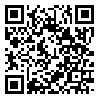Volume 18, Issue 2 (Volume18, Issue 2 2024)
2024, 18(2): 1-15 |
Back to browse issues page
Download citation:
BibTeX | RIS | EndNote | Medlars | ProCite | Reference Manager | RefWorks
Send citation to:



BibTeX | RIS | EndNote | Medlars | ProCite | Reference Manager | RefWorks
Send citation to:
agayousefi A, yousefi E. Development and testing of the causal model of students' tendency towards addiction based on insecure attachment styles with the mediation of coping styles. Research in psychological health 2024; 18 (2) :1-15
URL: http://rph.khu.ac.ir/article-1-4470-en.html
URL: http://rph.khu.ac.ir/article-1-4470-en.html
1- , arayeh1100@gmail.com
2- دانشیار، گروه روانشناسی، دانشگاه پیام نور، تهران، ایران
2- دانشیار، گروه روانشناسی، دانشگاه پیام نور، تهران، ایران
Abstract: (4674 Views)
The aim of the present study was to investigate the prediction model students' addiction tendencies based on insecure attachment styles with the mediation coping styles. The research method was descriptive and structural equation modeling. The statistical population in this research included undergraduate students of Payam Noor Qom University in 1400, from whom 285 people were selected as a sample using non-probability sampling method. The research tools included the Revised Attachment Styles Questionnaire (Collins and Reed, 1990), Coping Styles Questionnaire (Lazarus and Folkman, 1980) and Addiction Tendency Scale (Wade and Bopper, 1992). The results of the conceptual model test showed that the fit indices of the research model are in a favorable condition. Insecure attachment style and tendency to use drugs had a direct and significant relationship (P≤0.005). Also, insecure attachment style through coping styles had significant indirect effects on students' tendency to use drugs (P≤0.005). The findings of the research indicated the appropriate fit of the conceptual model of the research. Based on this, in addiction treatment clinics, it is necessary to pay attention to attachment styles and coping styles to reduce the level of addiction tendency.
Type of Study: Research |
Subject:
General
Received: 2024/05/6 | Accepted: 2024/09/21 | Published: 2024/10/2
Received: 2024/05/6 | Accepted: 2024/09/21 | Published: 2024/10/2
Send email to the article author
| Rights and permissions | |
 | This work is licensed under a Creative Commons Attribution-NonCommercial 4.0 International License. |





